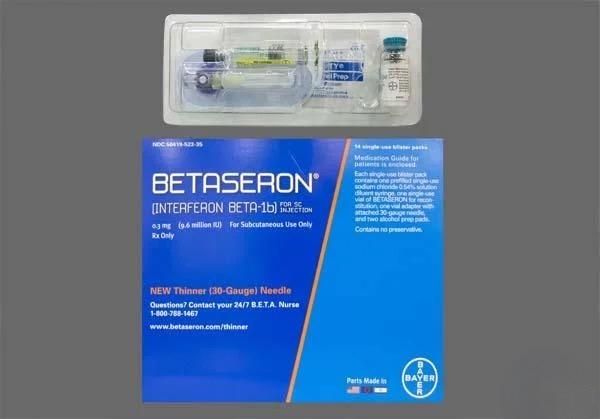Betaseron Interactions
There are 346 drugs known to interact with Betaseron (interferon beta-1b), along with 4 disease interactions, and 1 alcohol/food interaction. Of the total drug interactions, 14 are major, 331 are moderate, and 1 is minor.
- View all 346 medications that may interact with Betaseron
- View Betaseron alcohol/food interactions (1)
- View Betaseron disease interactions (4)
Most frequently checked interactions
View interaction reports for Betaseron (interferon beta-1b) and the medicines listed below.
- alprazolam
- amantadine
- Ampyra (dalfampridine)
- aspirin
- Aspirin Low Strength (aspirin)
- baclofen
- biotin
- clonazepam
- Cymbalta (duloxetine)
- diazepam
- duloxetine
- Fish Oil (omega-3 polyunsaturated fatty acids)
- gabapentin
- ibuprofen
- levothyroxine
- lisinopril
- lorazepam
- Lyrica (pregabalin)
- omeprazole
- prednisone
- Provigil (modafinil)
- tizanidine
- tramadol
- trazodone
- turmeric
- Tylenol (acetaminophen)
- Vitamin B12 (cyanocobalamin)
- Vitamin D3 (cholecalciferol)
- vitamin e
- Zoloft (sertraline)
Betaseron alcohol/food interactions
There is 1 alcohol/food interaction with Betaseron (interferon beta-1b).
Betaseron disease interactions
There are 4 disease interactions with Betaseron (interferon beta-1b) which include:
More about Betaseron (interferon beta-1b)
- Betaseron consumer information
- Compare alternatives
- Pricing & coupons
- Reviews (9)
- Drug images
- Side effects
- Dosage information
- During pregnancy
- Drug class: interferons
- En español
Related treatment guides
Drug Interaction Classification
| Highly clinically significant. Avoid combinations; the risk of the interaction outweighs the benefit. | |
| Moderately clinically significant. Usually avoid combinations; use it only under special circumstances. | |
| Minimally clinically significant. Minimize risk; assess risk and consider an alternative drug, take steps to circumvent the interaction risk and/or institute a monitoring plan. | |
| No interaction information available. |
See also:
Further information
Always consult your healthcare provider to ensure the information displayed on this page applies to your personal circumstances.


